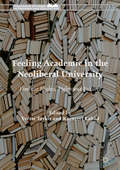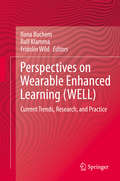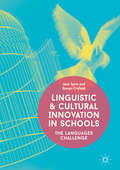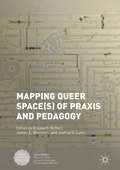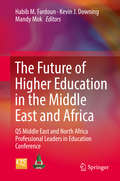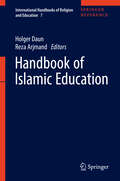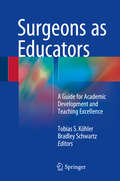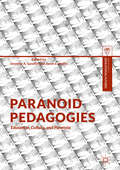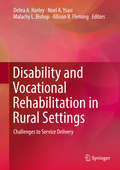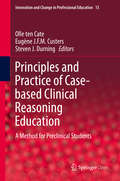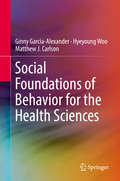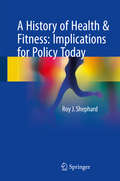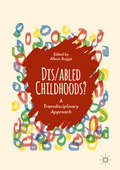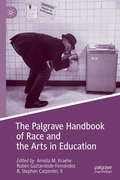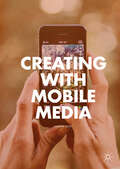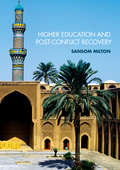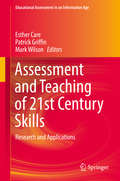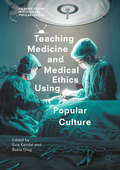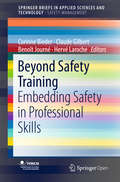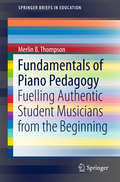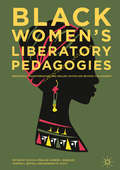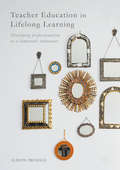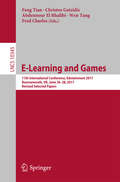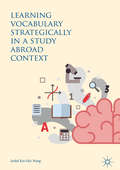- Table View
- List View
Feeling Academic in the Neoliberal University: Feminist Flights, Fights and Failures (Palgrave Studies in Gender and Education)
by Yvette Taylor Kinneret LahadThis book offers a contemporary account of what it means to inhabit academia as a privilege, risk, entitlement or a failure. Drawing on international perspectives from a range of academic disciplines, it asks whether feminist spaces can offer freedom or flight from the corporatized and commercialized neoliberal university. How are feminist voices felt, heard, received, silenced, and masked? What is it to be a feminist academic in the neoliberal university? How are expectations, entitlements and burdens felt in inhabiting feminist positions and what of 'bad feeling' or 'unhappiness' amongst feminists? The volume consider these issues from across the career course, including from 'early career' and senior established scholars, as these diverse categories are themselves entangled in academic structures, sentiments and subjectivities; they are solidified in, for example, entry and promotion schemes as well as funding calls, and they ask us to identify in particular stages of 'being' or 'becoming' academic, while arguably denying the possibility of ever arriving. It will be essential reading for students and researchers in the areas of Education, Sociology, and Gender Studies.
Perspectives on Wearable Enhanced Learning (WELL): Current Trends, Research, and Practice
by Fridolin Wild Ralf Klamma Ilona BuchemWearable technologies – such as smart glasses, smart watches, smart objects, or smart garments – are potential game-changers, breaking ground and offering new opportunities for learning. These devices are body-worn, equipped with sensors, and integrate ergonomically into everyday activities. With wearable technologies forging new human-computer relations, it is essential to look beyond the current perspective of how technologies may be used to enhance learning. This edited volume,“Perspectives on Wearable Enhanced Learning,” aims to take a multidisciplinary view on wearable enhanced learning and provide a comprehensive overview of current trends, research, and practice in diverse learning contexts including school and work-based learning, higher education, professional development, vocational training, health and healthy aging programs, smart and open learning, and work. This volume features current state of the art wearable enhanced learning and explores how these technologies have begun to mark the transition from the desktop through the mobile to the age of wearable, ubiquitous technology-enhanced learning.
Linguistic and Cultural Innovation in Schools
by Jane Spiro Eowyn CrisfieldThis book presents case studies of five schools engaged in radical change in order to engage with children's home languages and cultures in a more multilingual and inclusive way. Located around the globe, from Hawaii to Kenya, the case studies are informed by both researchers and professionals on the ground. While the schools in question are each anchored in a unique context and situation, they also have a common mission to see language diversity as a resource, and a responsibility to embrace all the languages of their pupils. The authors offer a rich resource for education professionals and policymakers, including not only theoretical insights but useful practical tips. This innovative volume will be a helpful resource for educational professionals interested in following a path of multilingualism as well as students and scholars of second language acquisition, heritage languages and cultures and multilingual educational policy.
Corporatizing Rural Education: Neoliberal Globalization and Reaction in the United States (New Frontiers in Education, Culture, and Politics)
by Jason A. CervoneThis book presents a critical analysis of the anti-democratic and pro-authoritarian ideologies that exist in rural communities in the United States. The author book also explores and recontextualizes existing research in rural education within this anti-democratic framework, as well as theorizing the consequences of this ideology as it takes place in the rural United States, specifically in regards to the physical and ideological shaping of rural communities to meet the needs of capitalist accumulation. Finally, it discusses the ways rural youth can reclaim the public sphere within their communities through critical education.
Mapping Queer Space(s) of Praxis and Pedagogy
by Elizabeth Mcneil James E. Wermers Joshua O. LunnThis book explores intersections of theory and practice to engage queer theory and education as it happens both in and beyond the university. Furthering work on queer pedagogy, this volume brings together educators and activists who explore how we see, write, read, experience, and, especially, teach through the fluid space of queerness. The editors and contributors are interested in how queer-identified and -influenced people create ideas, works, classrooms, and other spaces that vivify relational and (eco)systems thinking, thus challenging accepted hierarchies, binaries, and hegemonies that have long dominated pedagogy and praxis.
The Future of Higher Education in the Middle East and Africa: Qs Middle East And North Africa Professional Leaders In Education Conference
by Habib M. Fardoun Kevin J. Downing Mandy MokThis book addresses some of the challenges posed by the globalization of higher education. It examines the emergence and resulting challenges of English as Lingua Franca (ELF) and of the decision to use English as the Medium of Instruction (EMI) as part of a strategic policy of internationalization. It looks at survival challenges caused by globalization and expansion, the diversity challenge, the concept of marginality and how marginality can lead to creativity, teaching and encouraging entrepreneurialism, the tools needed for internationalizing higher education in developing countries, innovative approaches, the intelligent use of technology, and finally, the value of non-constraint engagement in driving teaching and course quality improvements. The expansion of higher education and the increasingly international body of students and staff continue to inspire and drive the development of global higher education systems. Whilst these systems began locally, many are now engaging with the challenges of retaining their local flavour whilst embracing the march of globalisation. The challenge is to find local solutions that also meet the requirements of the rapid development of what might be termed the ‘massification’ of international higher education. This book reflects these contemporary challenges through its variety of topics taken from countries as diverse as Hong Kong, Panama, South Africa, USA and Saudi Arabia. The topics are as diverse as some of the local solutions but each chapter represents a response to a rapidly changing global landscape.
Handbook of Islamic Education (International Handbooks Of Religion And Education Ser. #7)
by Holger Daun Reza ArjmandThis Handbook traces and presents the fundamentals of Islam and their history and background, and provides a global and holistic, yet, detailed picture of Islamic education around the world. It introduces the reader to the roots and foundations of Islamic education; the responses of Islamic educational institutions to different changes from precolonial times, through the colonial era up to the contemporary situation. It discusses interactions between the state, state-run education and Islamic education, and explores the Islamic educational arrangements existing around the world. The book provides in-depth descriptions and analyses, as well as country case studies representing some 25 countries.The work reflects the recent series of changes and events with respect to Islam and Muslims that have occurred during the past decades. The globalization of Islam as a religion and an ideology, the migration of Muslims into new areas of the globe, and the increasing contacts between Muslims and non-Muslims reinforce the need for mutual understanding. By presenting Islamic education around the world in a comprehensive work, this Handbook contributes to a deeper international understanding of its varieties.
Surgeons as Educators
by Tobias S. Köhler Bradley SchwartzThis book is designed to provide the reader with comprehension of the principles of contemporary surgical education and skills to design and implement effective curricula that include learning theory, needs assessments, curriculum development, effective teaching methods, valid and reliable assessment of learners, and comprehensive program evaluation. This text will provide a comprehensive, state-of-the art review of this field and will serve as a valuable resource for anyone wishing to become a better educator regardless of the level of the trainee. The book will review how people learn and how to vary teaching methods accordingly. It will cover curriculum planning, measurement and performance assessment, teaching residents to teach, coaching, promoting professionalism, teaching surgeons to lead, and burnout. It will aid in identifying differences in generations and how to select students and residents who will thrive in your program. Specifics on teaching in the operating room, use of new technologies and honing of feedback skills will be addressed. The effect of duty hours and due process for struggling learners will also be addressed as well as preparing residents for beyond residency. Specifics on how to set up simulation centers and utilize this technology will also be discussed. These are a few of the topics which will prepare the reader to excel in education and thus be able to positively influence patient care well beyond that of any one individual.
Paranoid Pedagogies
by Jason J. Wallin Jennifer A. SandlinThis edited book explores the under-analyzed significance and function of paranoia as a psychological habitus of the contemporary educational and social moment. The editors and contributors argue that the desire for epistemological truth beyond uncertainty characteristic of paranoia continues to profoundly shape the aesthetic texture and imaginaries of educational thought and practice. Attending to the psychoanalytic, post-psychoanalytic, and critical significance of paranoia as a mode of engaging with the world, this book further inquires into the ways in which paranoia functions to shape the social order and the material desire of subjects operating within it. Furthermore, the book aims to understand how the paranoiac imaginary endemic to contemporary educational thought manifests itself throughout the social field and what issues it makes manifest for teachers, teacher educators, and academics working toward social transformation.
Disability and Vocational Rehabilitation in Rural Settings
by Debra A. Harley Noel A. Ysasi Malachy L. Bishop Allison R. FlemingThis first-of-its-kind textbook surveys rehabilitation and vocational programs aiding persons with disabilities in remote and developing areas in the U. S. and abroad. Contributors discuss longstanding challenges to these communities, most notably economic and environmental obstacles and ongoing barriers to service delivery, as well as their resilience and strengths. Intersections of health, social, structural, and access disparities are shown affecting rural disabled populations such as women, racial and sexual minorities, youth, and elders. In terms of responses, a comprehensive array of healthcare and health policy solutions and recommendations is critiqued with regard to health, employment, and service effectiveness outcomes. Included among the topics: Healthcare initiatives, strategies, and challenges for people with disabilities in rural, frontier, and territory settings. Challenges faced by veterans residing in rural communities. The Asia and Pacific region: rural-urban impact on disability. Challenges after natural disaster for rural residents with disabilities. Meeting the needs of rural adults with mental illness and dual diagnoses. Capacity building in rural communities through community-based collaborative partnerships. Disability and Vocational Rehabilitation in Rural Settings makes a worthy textbook for graduate students and upper-level undergraduates in the fields of social work, community and environmental psychology, public health, sociology, education, and geography. Its professional audience also includes vocational rehabilitation counselors serving these dynamic populations.
Principles and Practice of Case-based Clinical Reasoning Education
by Steven J. Durning Olle Ten Cate Eugène J.F.M. CustersThis book is open access under a CC BY 4. 0 license. This volume describes and explains the educational method of Case-Based Clinical Reasoning (CBCR) used successfully in medical schools to prepare students to think like doctors before they enter the clinical arena and become engaged in patient care. Although this approach poses the paradoxical problem of a lack of clinical experience that is so essential for building proficiency in clinical reasoning, CBCR is built on the premise that solving clinical problems involves the ability to reason about disease processes. This requires knowledge of anatomy and the working and pathology of organ systems, as well as the ability to regard patient problems as patterns and compare them with instances of illness scripts of patients the clinician has seen in the past and stored in memory. CBCR stimulates the development of early, rudimentary illness scripts through elaboration and systematic discussion of the courses of action from the initial presentation of the patient to the final steps of clinical management. The book combines general backgrounds of clinical reasoning education and assessment with a detailed elaboration of the CBCR method for application in any medical curriculum, either as a mandatory or as an elective course. It consists of three parts: a general introduction to clinical reasoning education, application of the CBCR method, and cases that can used by educators to try out this method.
Social Foundations of Behavior for the Health Sciences
by Ginny Garcia-Alexander Hyeyoung Woo Matthew J. CarlsonThis textbook helps students in the health sciences prepare for the social foundations portion of the Medical College Admission Test (MCAT). It provides a solid understanding of the fundamental concepts, theories, and methodologies in sociology that the MCAT exam requires. This book offers a condensed overview of the sociological concepts covered during a 15 week semester. It helps students gain an understanding of the social foundations of behavior, and the social determinants of health within the professional context of medicine. Students are provided with the necessary basics in addition to case studies, learning and research activities, recommended external resources, and study questions. These are meant to develop pre-health students' understanding of the importance of the social factors that influence health outcomes. The featured activities contain various exercises using examples of sociology of health and medicine, including social factors shaping health, social relations between doctors and patients, and the health care system, among others. As a result, this book well informs not only those who wish to prepare for the MCAT to pursue a career in the health profession, but also anyone who is interested in social perspectives on health and medicine.
A History of Health & Fitness: Implications for Policy Today
by Roy J. ShephardThis book provides a unique and succinct account of the history of health and fitness, responding to the growing recognition of physicians, policy makers and the general public that exercise is the most potent form of medicine available to humankind. Individual chapters present information extending from the earliest reaches of human history to the present day, arranged in the form of 30 thematic essays covering topics from the supposed idyll of the hunter-gatherer lifestyle and its posited health benefits to the evolution of health professionals and the possible contribution of the Olympic movement to health and fitness in our current society. Learning objectives are set for each topic, and although technical language is avoided as far as possible, a thorough glossary explains any specialized terms that are introduced in each chapter. The critical thinking of the reader is stimulated by a range of questions arising from the text context, and each chapter concludes with a brief discussion of some of the more important implications for public policies on health and fitness today and into the future. The material will be of particular interest to graduate and undergraduate students in public health, health promotion, health policy, kinesiology, physical education, but will be of interest also to many studying medicine, history and sociology.
Dis/abled Childhoods?
by Allison BoggisThis edited collection explores the intersectionality of childhood and disability. Whereas available scholarship tends to concentrate on care-giving, parenting, or supporting and teaching children and young people with special educational needs and disabilities, the contributors to this collection offer an engaging and accessible insight into childhoods that are impacted by disability and impairment. The discussions cut across traditional disciplinary divides and offer critical insights into the key issues that relate to disabled children and young people's lives, encouraging the exploration of both disability and childhoods in their broadest terms. Dis/abled Childhoods? will be of interest to students and scholars across a range of disciplines including Special Educational Needs; Childhood Studies; Disability Studies; Youth Studies; and Health and Social Care.
The Palgrave Handbook of Race and the Arts in Education
by Amelia M. Kraehe Rubén Gaztambide-Fernández B. Stephen Carpenter IIThe Palgrave Handbook of Race and the Arts in Education is the first edited volume to examine how race operates in and through the arts in education. Until now, no single source has brought together such an expansive and interdisciplinary collection in exploration of the ways in which music, visual art, theater, dance, and popular culture intertwine with racist ideologies and race-making. Drawing on Critical Race Theory, contributing authors bring an international perspective to questions of racism and anti-racist interventions in the arts in education. The book’s introduction provides a guiding framework for understanding the arts as white property in schools, museums, and informal education spaces. Each section is organized thematically around historical, discursive, empirical, and personal dimensions of the arts in education. This handbook is essential reading for students, educators, artists, and researchers across the fields of visual and performing arts education, educational foundations, multicultural education, and curriculum and instruction.
Creating with Mobile Media
by Marsha BerryThis book investigates the convergence between locative, mobile and social media in order to show how people use mobile media for their creative practice--creative writing, photography, video and filmmaking. The central thematic focus of this book explores how mobile media has created new opportunities and contexts for creative practitioners. It draws together creative practice research with non-representational theory and digital ethnography to provide a fresh perspective on the place mobile media has in our everyday creative lives. Fictionalized and semi-fictional vignettes are used to present empirical material taken from fieldnotes and interviews to demonstrate how new forms and genres of art making have arisen because of the affordances of mobile media. The chapters in this volume have been arranged into a sequence according to the kinds of actions that make up various creative practices.
Higher Education and Post-Conflict Recovery
by Sansom MiltonThis book offers a critical review of higher education and post-conflict recovery. It provides the first systematic study with a global scope that investigates the role of higher education systems in conflict-affected contexts. The first part of the book analyses the long-standing neglect of higher education in post-conflict recovery, the impact that conflict can have on the sector, and efforts to rebuild and reform higher education systems affected by violent conflict. The second part of the book considers the positive and negative contributions that higher education can make to a range of areas of recovery including humanitarian action, forced displacement, post-conflict reconstruction, statebuilding, and peacebuilding. With its reasoned defence of the importance of higher education for post-conflict recovery, the book will appeal to researchers, university students, and humanitarian and development policy-makers and practitioners.
Assessment and Teaching of 21st Century Skills: Research and Applications (Educational Assessment in an Information Age)
by Mark Wilson Patrick Griffin Esther CareRapid--and seemingly accelerating--changes in the economies of developed nations are having a proportional effect on the skill sets required of workers in many new jobs. Work environments are often technology-heavy, while problems are frequently ill-defined and tackled by multidisciplinary teams. This book contains insights based on research conducted as part of a major international project supported by Cisco, Intel and Microsoft. It faces these new working environments head-on, delineating new ways of thinking about '21st-century' skills and including operational definitions of those skills. The authors focus too on fresh approaches to educational assessment, and present methodological and technological solutions to the barriers that hinder ICT-based assessments of these skills, whether in large-scale surveys or classrooms. Equally committed to defining its terms and providing practical solutions, and including international perspectives and comparative evaluations of assessment methodology and policy, this volume tackles an issue at the top of most educationalists' agendas.
Teaching Medicine and Medical Ethics Using Popular Culture
by Evie Kendal Basia DiugThis book demonstrates how popular culture can be successfully incorporated into medical and health science curriculums, capitalising on the opportunity fictional media presents to humanise case studies. Studies show that the vast majority of medical and nursing students watch popular medical television dramas and comedies such as Grey's Anatomy, ER, House M. D. and Scrubs. This affords us with a unique opportunity to engage and inform not only students but the general public and patients further downstream. This volume analyses examples of medical-themed popular culture and offers various strategies and methods for educators in this field to integrate this material into their teaching. The result is a fascinating read and original resource for medical professionals and teachers alike.
Beyond Safety Training: Embedding Safety in Professional Skills (SpringerBriefs in Applied Sciences and Technology)
by Corinne Bieder Claude Gilbert Benoît Journé Hervé LarocheThis book is open access under a CC BY 4. 0 license. This book investigates why, despite more and more resources devoted to safety training, expectations are not entirely met, particularly in the industrial sectors that have already achieved a high safety level. It not only reflects the most precious viewpoints of experts from different disciplines, different countries, with experiences in various industrial fields at the cutting edge of theories and practices in terms of safety, professionalization and their relationships. It also consolidates the positioning of the Foundation for an Industrial Safety Culture, highlighting what is currently considered at stake in terms of safety training, taking into account the system of constraints the different stakeholders are submitted to. It reports some success stories as well as elements which could explain the observed plateau in terms of outcome. It identifies some levers for evolution for at-risk industry and outlines a possible research agenda to go further with experimental solutions.
Fundamentals of Piano Pedagogy: Fuelling Authentic Student Musicians from the Beginning (SpringerBriefs in Education)
by Merlin B. ThompsonHow can piano teachers successfully foster student participation and growth from the outset? How can teachers prepare and sustain their influential work with beginner student musicians? This book presents answers to these questions by making important connections with current music education research, masters of the performance world, music philosophers, and the author’s 30-year career as a piano pedagogy instructor in Canada, the USA, Australia, New Zealand, and Japan. It investigates the multilayered role piano teachers play right from the very beginning – the formative first four to five years during which teachers empower students to explore and expand their own emerging musical foundations. This book offers a humane, emancipatory, and generous approach to teaching by grappling with some of the most fundamental issues behind and consequences of studio music teaching. More experiential than abstract and cerebral, it demonstrates how teaching beginner piano students involves an attentiveness to musical concerns like our connection to music, learning to play by ear and by reading, caring for music, the importance of tone and technique, and helping students develop fluency through their accumulated repertoire. Teaching beginner students also draws on personal aspects like independence and authenticity, the moral and ethical dignity associated with democratic relationships, and meaningful conversations with parents. Further, another layer of teaching beginners acknowledges both sides of the coin in terms of growth and rest, teaching what is and what might be, as well as supporting and challenging student development. In this view, how teachers fuel authentic student musicians from the beginning is intimately connected to the knowledge, beliefs, and values that permeate their thoughts and actions in everyday life. Fundamentals of Piano Pedagogy stands out as a much-needed instructional resource with immense personal, practical, social, philosophical, educational, and cultural relevance for today’s studio music teachers. Its humanistic and holistic approach invites teachers to consider not only who they are and what music means to them, but also what they have yet to imagine about themselves, about music, their students, and life.
Black Women's Liberatory Pedagogies: Resistance, Transformation, and Healing Within and Beyond the Academy
by Olivia N. Perlow Durene I. Wheeler Sharon L. Bethea BarBara M. ScottThis interdisciplinary anthology sheds light on the frameworks and lived experiences of Black women educators. Contributors for this anthology submitted works from an array of academic disciplines and learning environments, inviting readers to bear witness to black women faculty's classroom experiences, as well as their pedagogical approaches both inside and outside of the higher education classroom that have fostered transformative teaching-learning environments. Through this multidimensional lens, the editors and contributors view instruction and learning as a political endeavor aimed at changing the way we think about teaching, learning. and praxis.
Teacher Education in Lifelong Learning
by Alison IredaleThis book promotes the idea that professionalism among teachers should be marked by democratic relations, rather than by managerialism and performance management. It provides a thorough investigation of issues around the participation of trainee teachers in the Lifelong Learning Sector, by reflecting on their experiences and questioning how well initial teacher education prepares teachers as professional practitioners in the sector. The reflexive nature of the book promotes a deep discussion of the nature of professionalism, drawing upon the works of John Dewey, Michel Foucault and Pierre Bourdieu, and places initial teacher education in the Lifelong Learning Sector firmly within the policy and ideological context of regulation, audit and control. It also illuminates pertinent discussions around teacher agency through a consideration of confidence, excellence, and routinised practices. Finally, the book takes us 'through the looking glass' to reveal the tensions within the teacher education curriculum as it prepares trainee teachers for a ready-made world, whilst at the same time attempting to encourage principles of social justice, inclusive practice and education as a democratic endeavour. It will be compelling reading for students and researchers working in Education and Sociology, particularly those with an interest in lifelong learning and teacher training.
E-Learning and Games
by Christos Gatzidis Feng Tian Abdennour El Rhalibi Wen Tang Fred CharlesThis book constitutes the refereed proceedings of the 10th International Conference on E-Learning and Games, Edutainment 2016, held in Hangzhou, China, in April 2016. The 36 full papers presented were carefully reviewed and selected from 60 submissions. They are organized in the following topical sections: E-learning and game; graphics, imaging and applications; intelligent data analytics and visualization.
Learning Vocabulary Strategically in a Study Abroad Context
by Isobel Kai-Hui WangThis book focuses on case studies of vocabulary strategy use and presents an in-depth account of the vocabulary learning experiences of Chinese students in the UK. It challenges the view that vocabulary strategies result only from learners' cognitive choices, and provides insightful analysis of the interplay between learner characteristics, agency and context in the process of strategic learning. The author makes a strong case for using qualitative methodologies to examine the dynamic, complex and contextually situated nature of strategic vocabulary learning. Drawing on multiple data sources, the book discusses issues that are central to the continuing development of vocabulary strategy research and offers theoretical, research-based and practical suggestions for future exploration. This book will appeal to students and scholars of second language acquisition, vocabulary and applied linguistics.
